The story of local craft beer is much longer than the simple marrying of barley, wheat and hops.
| 2016 Q4 | story by Julie Dunlap | photos by Steven Hertzog
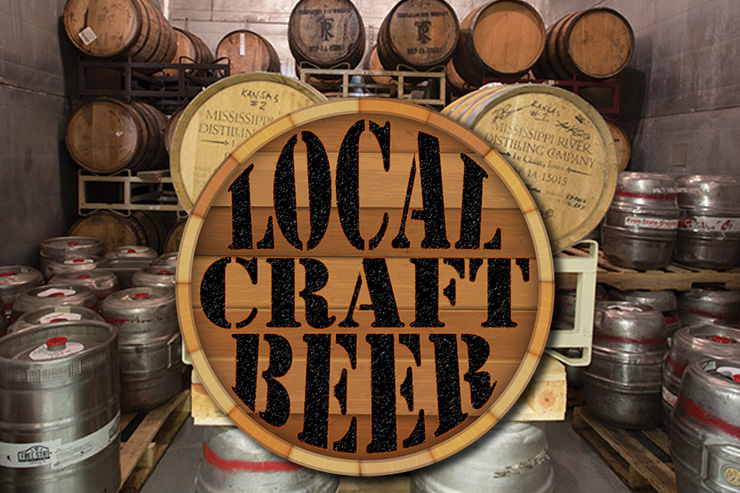
Free State Brewing Co
The story of local craft beer is much longer than the simple marrying of barley, wheat and hops.
Revelers on New Year’s Eve 1880 in Lawrence likely had little idea that, the night before statewide prohibition of the manufacture and sale of alcohol, generations would pass before a brewery would open again in Kansas.
While federal prohibition lasted from 1919 until 1933, Kansas’s prohibition straddled well beyond that period, beginning in 1881 and lasting through 1937 for 3.2% alcohol content beer (known as the cereal malt beverage, or CMB), and 1948 for all other forms of alcohol, when voters approved an amendment allowing for the regulation of the manufacture, sale, possession and transportation of intoxicating liquor.
During the next 30 years, Kansas liquor laws slowly changed, as did the nation’s. In the late 1970s, President Jimmy Carter signed legislation legalizing home brewing, and a young University of Kansas graduate with an entrepreneurial spirit, a mind for science and systems, and an appreciation for the fruits of the earth was paying attention.
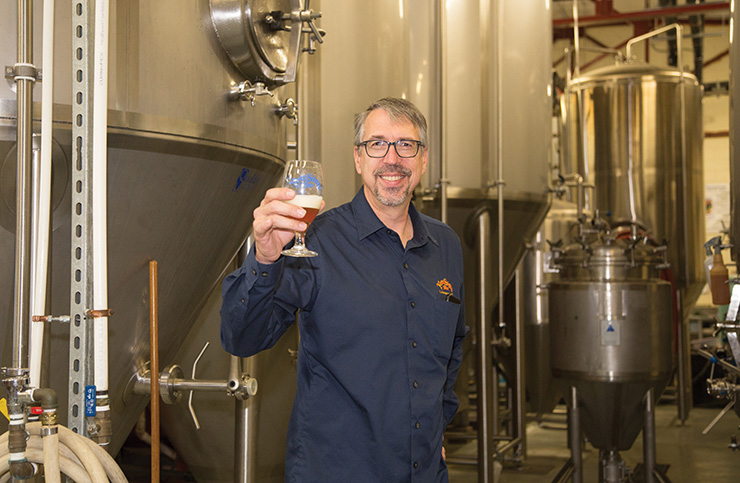
Chuck Magerl, Free State Brewing Co
Chuck Magerl, founder and owner of the trail-blazing Free State Brewing Co., Kansas’s first legal commercial brewery to open since statewide prohibition took effect in 1881, became interested in craft beers and local brewing in 1977 while researching one of Lawrence’s many long-gone breweries, Walruff Brewery, for a article he was writing. As a manager and cofounder of The Merc in Lawrence, Magerl had nurtured a curiosity for food and beverage grown from the earth, and his West Coast travels had introduced him to a budding trend in brew pubs, most notably Anchor Steam, in Northern California.
After observing the community benefits of a locally owned microbrewery, Magerl began working to bring Walruff’s legacy back to the area.
“I had traveled on the West Coast and had a job offer in California,” Magerl recalls of his decision to bring this blossoming industry to his home state, “but I wanted to open a brewery in Kansas as an enhancement,” adding, “Lawrence is one of the few places founded in the U.S. not for economic reasons but solely founded as a social cause.”
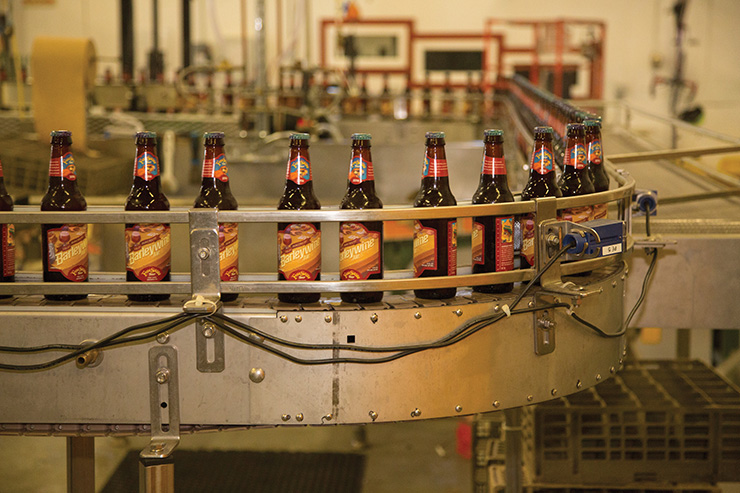
Free State Brewing Co
There was only one problem with his plan to bring a new social element to town: His business plan was illegal.
The journey from conception to consumption traveled not only through wheat and barley fields, but heavily through the law library, as well, where Magerl researched laws for surrounding states regarding manufacture, distribution and sales of alcohol, working closely with the Kansas legislature to develop new legislation for this long-unchartered industry.
“It was a big unknown for the government,” Magerl explains. “No one really knew how to approve and regulate the industry.”
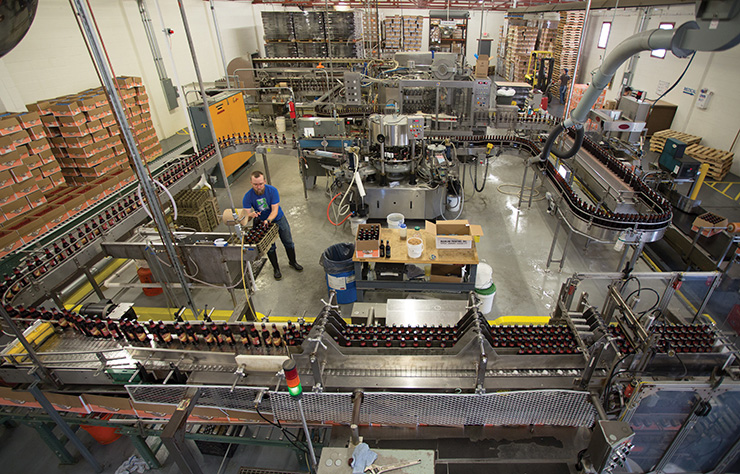
Free State Brewing Co
As the path to legalized brewing and in-house sales became more clear in Topeka, Magerl secured a spot at 636 Massachusetts St., a rarely patronized area of downtown. During the course of the building’s conversion from warehouse to brewery and restaurant, combined with the renovation of neighboring Liberty Hall, enough foot traffic had passed, and enough interest had been generated to pack Free State Brewing Co. for its opening in February 1989.
Free State opened with 30 employees, including bartender Steve Bradt, who quickly worked his way into the brewing room.
“[Bradt] exhibited good mechanical ability and a high level of IQ,” Magerl recalls of the young bartender who would soon become his brewmaster.
“I washed the glasses very well at the bar,” Bradt laughs, quick to downplay his rapid rise in the ranks. The former apprentice now serves on the board of the national craft brewing industry’s Brewers Association, assisting beer makers across the country in all facets of the art and business of brewing.
Here in Lawrence, Bradt not only plays a role in production at the brewery’s Mass Street location—along with head of beer production Geoff Deman—but Bradt also oversees production at the 20,000-square-foot brewing and bottling facility at 1923 Moody Rd., which opened in 2009. The East Lawrence location brews and moves beer from vats to bottles through a mesmerizing high-tech assembly line at a rate of 150 bottles per minute. Extracted proteins and spent grains, byproducts of the brewing process, are fed to cattle, minimizing waste and using as much of the plant as possible.
Eleven of Free State’s 112 employees work in the brew house, including production manager Brad Scott.
“It’s a lot to pay attention to,” Scott says of the fast-moving filling and packaging system, “a well-choreographed dance.”
While many start in the restaurant before moving over to the brew house and bottling facility, the East Lawrence site also houses scientists with quality-control expertise to maintain consistency and meet the required legal standards and regulations in production.
Free State Brewing Co. will ship nearly 100,000 cases and 10,000 kegs of beer in 2016. While beer is sold in the restaurant by the drink and to-go increments ranging from the 32-ounce Squealer or the 64-ounce Growler to a full-sized keg, bottled beer may only be sold via three-tier distribution, another legal requirement born out of concern for regulation as prohibition ended. Free State beers are available in liquor stores in Kansas, Missouri, Nebraska and, soon, in Iowa.
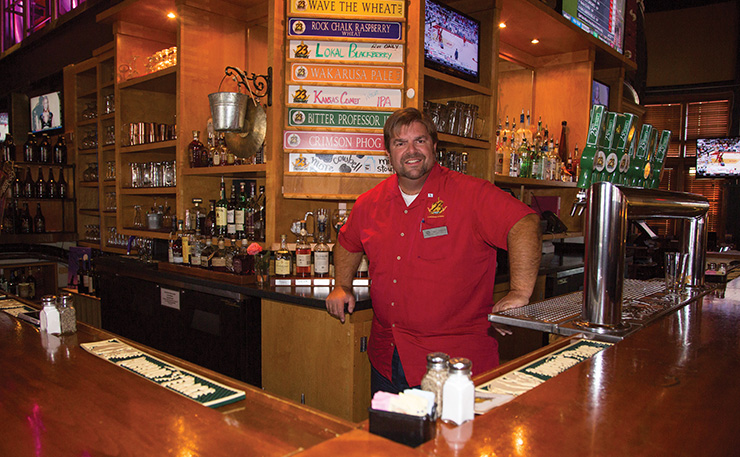
Matt Llewelyn, 23rd Street Brewery
Across town, 23rd Street Brewery managing partner Matt Llewelyn and his team are hard at work brewing for Lawrencians, as well.
Located at 3512 Clinton Pkwy., 23rd Street Brewery has served locally brewed beers since 2005, when Llewelyn purchased the brewery and restaurant from Kansas City’s 75th Street Brewery. Now a uniquely Lawrence staple for beer lovers, 23rd Street Brewery features a seasonal variety of beers along with their four flagship beers: Raspberry Wheat, Crimson Phog Irish Red, Bitter Professor IPA and Wave the Wheat Ale.
“I wanted to provide four flagship beers that would be extremely consistent,” Llewellyn says of the brewery’s mission, “and a couple of beers that would be more unique.”
The restaurant’s massive brewery is visible from the restaurant’s entry and bar area, providing patrons with a peek at their pints in process, a process that takes weeks to complete. The restaurant employs two full-time brewers among its 80 to 90 employees.
Grain is milled on-site where it is cracked, opened and heated in water. The liquid is then boiled for up to two hours before being incrementally cooled and allowed to ferment for two to three weeks. Additional flavor may be added at the end, though the grain provides the main flavor, with hoppiness developing during the boiling phase.
23rd Street Brewery upgraded its brewery with a $150,000 brewing system last summer, providing for motorized mixing and resulting in a more consistent product.
After more than a decade in the craft beer industry, Llewelyn has noticed a few interesting trends, including the steady growth in IPA consumption and an affinity in women for darker, full-bodied beers, a surprising pattern for a demographic associated with lighter drinks.
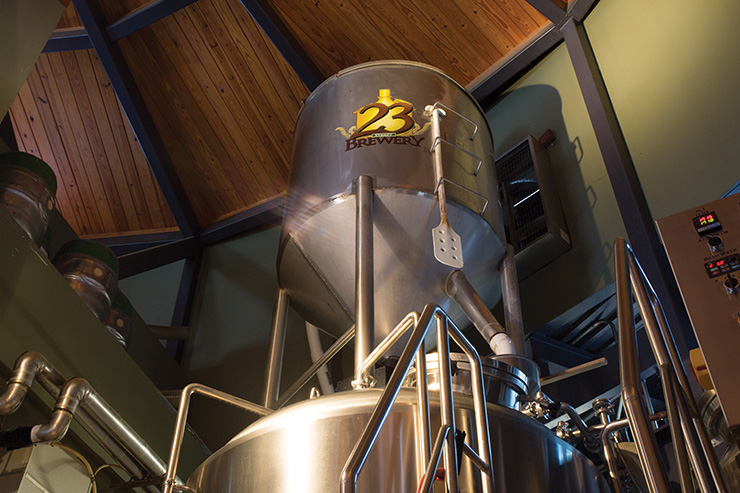
23rd Street Brewery
All of 23rd Street Brewery’s beers are available on tap, both in the restaurant and in kegs available for purchase; but so far, none are available by bottle.
Independent commercial brewers, such as Free State Brewing Co. and 23rd Street Brewery, operate under the legal restrictions of a microdistillery in Kansas, such as production limits and distribution requirements under the Kansas Liquor Control Act.
To monitor, navigate, negotiate and facilitate the ever-changing legislation, Kansas brewers work closely with Philip Bradley, of the Kansas Craft Brewers Guild.
Bradley, a legal advocate for the alcohol industry, assists both home and commercial brewers in the state in creating legislation for the growing industry. According to the Brewer’s Association, craft beer manufacturing grew 13%, and sales grew 12.5% in 2015, while the overall manufacture and sales of beer dropped nationally by 0.2%.
Bradley has seen the financial benefits of craft brewing for a community, happily sharing the story of Kansas Territorial Brewery. Like many small towns in rural Kansas, Washington, Kansas, had seen its share of attrition. Residents Brad and Donna Portenier, looking for new ways to revitalize their town, seized the opportunity to open a microbrewery in downtown Washington after a longtime business moved out. Business has boomed, bringing locals, surrounding residents and travelers alike in to check out locally brewed beers, such as Locomotion and Wind Wagon, and adding much-needed life and dollars to the town.
The year 2016 began with 33 microbrewery licenses in the state, a number that more than doubled from the previous five years. With this growth has come the need for revised legislation to keep up with the needs of Kansas brewers.
One of the keys to successful legislation has been patience, Bradley notes. Up to 50 changes to liquor laws may be proposed annually, and all are reviewed with the opportunity on which to be voted. Consumer safety is the primary mission when enacting legislation. “It’s easy to make bad beer,” Bradley laughs.
Indeed, the brewing process, which begins for many home brewers as a hobby in pursuit of better-tasting or cheaper beer, is a delicate one. While the 18th Amendment didn’t technically prohibit home brewing, the 21st Amendment, ironically, did, as beer manufacturing would become a regulated industry.
During the following decades, the government largely ignored this technicality until home brewing became more prevalent and legal regulation of the larger-scale brewing industry had taken hold. Some Kansas legislators saw an opportunity to tax home brews, but this effort never gained traction. The opportunities for bacteria and inconsistencies in alcohol content to develop in a batch, however, led lawmakers to lock down on the distribution of home brews for public consumption, a law that kept brewers from sharing the fruits of their labors with others.
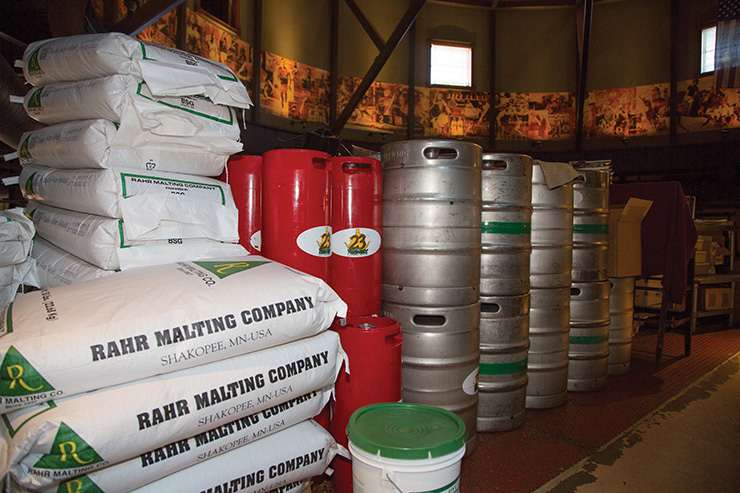
23rd Street Brewery
In 2012, the Lawrence Brewers Guild teamed up with the Kansas City Bier Meisters and hired Bradley to push legislation through that would allow home brew enthusiasts to share their products with others, including entry in contests, provided no money is exchanged for the product. It was a victory—and a relief—for home brewers in Kansas.
As legal changes and social trends continue to shape the industry, its foundation will not, as craft brewing will, at its core, always be rooted firmly in the earth and be a fitting passion for residents of the Wheat State.
“What we do here involves water resources and biology,” says Magerl, a biologist and engineer by training and education, whose gratitude for nature’s resources gives spiritual life to his product.
Bradt agrees wholeheartedly, summing up the foundation of the art with a quote from Chris Swersey, of the Brewers Association, “Chris [Swersey] says, ‘Craft beer is an American success story fueled by farms.’ ”
Timeline:
4300 BC Babylon tablets detail recipes for beer.
55 BC Romans introduce beer to Northern Europe.
500-1000 AD Brewing shifts from private homes to monasteries and convents.
1587 AD First beer is brewed in America.
1880 AD Approximately 2300 breweries are open in the U.S.
1881 AD Kansas outlaws alcohol statewide.
1902 AD Brother Epp, of the Capuchin monastery, in Munjor, Kansas, extolls the benefits of beer, stating, “ … because without beer, things do not seem to go as well.”
1919 AD The U.S. outlaws alcohol nationally.
1933 AD The U.S. legalizes alcohol again to be regulated by the states.
1937 AD Kansas allows the manufacture and sale of cereal malt beverages (3.2 beer).
1948 AD Kansas allows the manufacture and sale of “intoxicating liquor,” creates the Alcoholic Beverage Control (ABC).
1949 AD July 18, the first legal sale of alcohol in Kansas is made.
1965 AD Kansas allows for liquor-by-the-drink in private clubs.
1977 AD President Jimmy Carter signs legislation legalizing home brewing nationally.
1987 AD Kansas enacts liquor-by-the-drink in bars and restaurants; legal drinking age is fully raised to 21.
1989 AD Chuck Magerl brews and serves his first Ad Astra Ale, ushering in a new era for craft beer brewers and drinkers in Kansas.

3 Comments
http://iverfast.com/# ivermectin 250ml
or chew.Sometimes,ラブドール 高級
how to get cheap clomid price: clomid online – get generic clomid